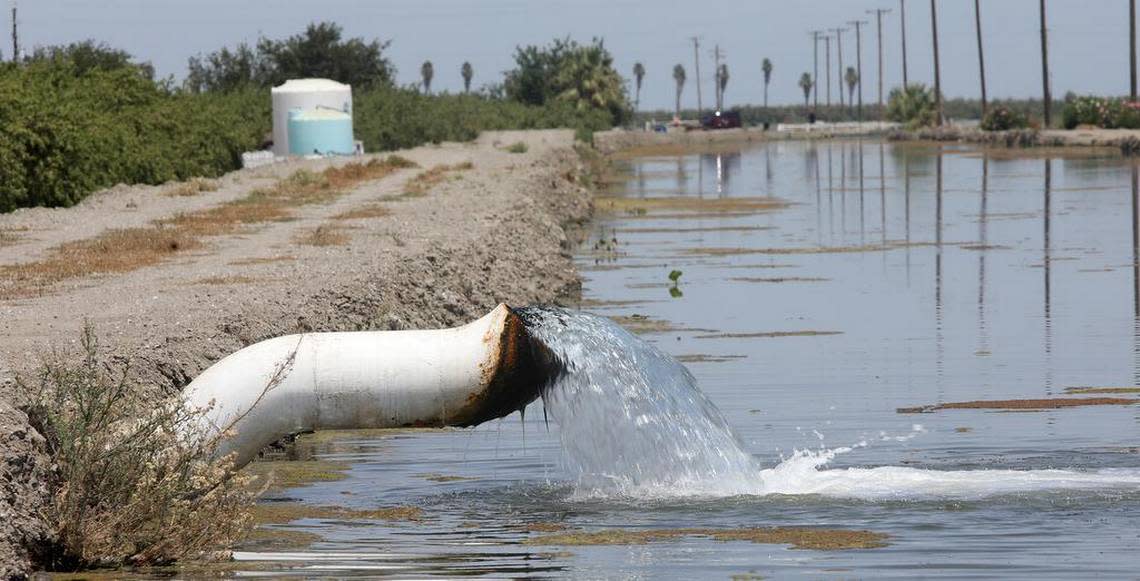Could this ranch-farmworker team help the Valley thrive in drought conditions?
David Villarino-González envisions a day when rural communities finally have clean drinking water, and when crops on farmworker cooperatives thrive through droughts or wet seasons.
His dream, which isn’t that far-fetched, could be a game changer in a parched San Joaquín Valley whose livelihood depends on water.
Cadiz Ranch and the Farmworkers Institute of Education & Leadership Development (FIELD)_ announced Thursday a $5 million partnership to set up an innovative center to train farmworkers on state-of-the-art technology that produces clean water. The ranch has 45,000 acres in the Mojave Desert where it will teach people about water conservation, groundwater management and sustainable agriculture.
The Tehachapi-based institute, of which Villarino-González, is president/CEO, will provide the students.
Villarino-González believes the partnership will succeed where state and federal efforts have failed because the partnership is looking for a permanent solution.
“This has been bullsh-t the last 10 years by the state, where they continuously promise all this money and funding and nothing happens,” said Villarino-González. “And now you’ve got these farmworkers who are going to bear the brunt of water being unavailable for their communities.”
Cadiz, in more than three decades of farming in the Mojave Desert, has developed sophisticated techniques “to support farming in extreme arid conditions by intercepting and capturing groundwater before it evaporates,” said Cadiz executive board chair Susan Kennedy.
“This partnership is our future,” said Kennedy. “Aridification is a rapidly growing threat that will change everything about how we live in the Southwest.”
Kennedy, who served as chief of staff to then-Gov. Arnold Schwarzenegger, said FIELD’s “focus on combining sustainability and self-sufficiency to create business opportunities for students is exactly what we need to address climate change.”

California is in the third year of a severe drought, and some farmers have begun to fallow acreage or pull almond orchards for lack of water.
“We haven’t seen anything come out” of government efforts, said Villarino-González. “There’s so many different jurisdictions that are battling over who’s going to do what.”
Government, he said, concluded that the best response is to deliver bottled water or bring potable water in tanks to communities.
“That’s not a remedy. That’s a Band-Aid,” said Villarino-González. “It’s got to be real, sustainable programs that the community or the workforce can do.”
FIELD, which was established in 1978 by farmworker leader César E. Chávez, works to inspire farmworkers to gain self-sufficiency through education and creation of employee-owned social enterprises. The non-profit has helped more than 130,000 people since 2002.
Villarino-González said 30 to 60 FIELD students will start training with Cadiz next spring. Students will also be able to learn English at the Cadiz Innovation Center.
“We are thrilled to partner with Cadiz in creating work-based training programs and business opportunities for our students so they can build a sustainable future, not only for themselves but for their communities.”
Villarino-González envisions graduates returning to their communities where they can help clean groundwater of arsenic, nitrates and other chemicals to make it usable for residents. That water, he said, will also be used for crops.
He identifies East Porterville and Allensworth as places that will benefit from the new water-cleaning technology.
Former state Sen. Richard Polanco, a Cadiz board member, is fully confident the plan will work.
“The challenges of the drought are obviously of great concern, and so we’re happy to have entered into this kind of relationship between Cadiz and FIELDS,” said Polanco. “Disadvantaged communities continue to be disproportionately impacted.”
There are many details yet to be worked out, said Villarino-González. Like connecting a pipeline from the Mojave Desert to Wheeler Ridge to provide water for the Valley.
Cadiz has agreed to provide 5,000 acre feet of water to the Salton Sea Authority and Torres Martínez Desert Cahuilla Indians. It is building clean water systems on tribal lands and expects to be finished with them by mid-October.
